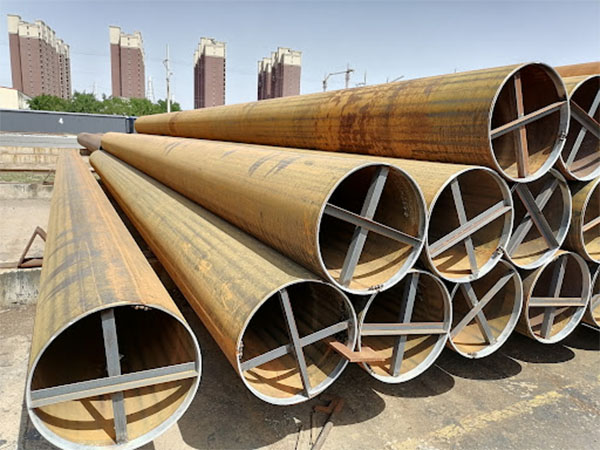EFW (Electric Fusion Welded) steel pipe, also known as electric fusion welded steel pipe, is a kind of longitudinal straight seam welded pipe formed by melting and welding the edges of the steel strips on both sides by arc or resistance melting process. The welds of EFW steel pipes feature stable quality and high dimensional accuracy, and are widely used in fields such as petroleum, natural gas, chemical engineering, and municipal transportation pipelines.

The production process of EFW steel pipes
1. Material selection: Select appropriate steel plate raw materials based on the required chemical elements and mechanical properties of the project, check for any defects, and remove surface impurities.
2. Sheet cutting: Cut the sheet into the required size and process the cutting edges to ensure that the steel plates on both sides can be precisely joined during the welding process.
3. Sheet metal forming: After the sheet metal has been cut, it is placed in a rolling mill or press, and pressure is gradually applied to bend the steel pipe into a cylindrical shape. The formed steel pipe is then adjusted to ensure that both sides of the pipe edge are perfectly aligned. After ensuring that both ends of the steel pipe are aligned, beveling can be carried out on its edges, which is conducive to the penetration of the weld seam.
4. Arc welding: It uses the method of arc melting to fuse the edges of the sheet metal and form a weld seam.
5. Forming correction: After welding, the steel pipes are rolled and shaped to achieve a standard circular cross-section.
6. Heat treatment of steel pipes: Heating the entire pipe or welding area to a predetermined temperature and then cooling it under controlled conditions can effectively reduce welding stress, improve the metallographic structure and mechanical properties of the weld seam.
7. Inspection and testing: Mainly includes dimensional inspection, ultrasonic or radiographic testing, mechanical property testing or hydrostatic testing.
8. Post-treatment: Surface treatment (pickling, sandblasting), cutting, end processing (chamfering), marking and packaging for factory release as required.
Standard grades of EFW steel pipes
EFW steel pipes mainly comply with the following international standards or ASTM standards:
ASTM A358: Stainless steel EFW pipes (such as TP316L) suitable for corrosion-resistant applications.
ASTM A671 / A672: Carbon steel EFW tubes applicable to different temperature ranges (A672: Medium temperature; A671: Low temperature.
ASTM A691: Carbon steel and alloy steel EFW pipes suitable for high-temperature and high-pressure environments, with chromium and molybdenum elements added to the material to enhance high-temperature resistance.
API 5L: Carbon steel EFW pipes used for oil and gas transportation. Common grades include Grade B, X42 - X70, etc.
Other relevant standards: such as ASTM A134, etc., also cover the corresponding SAW/EFW processes.
Pipe type
The pipe type of EFW steel pipe is straight seam steel pipe, which can be divided into carbon steel EFW steel pipe and alloy steel EFW steel pipe.
Carbon steel EFW steel pipe
Common standards: ASTM A672, A671, API 5L (such as Grade B, X60 - X70), etc.
Material features: The carbon content ranges from low to medium. It has excellent mechanical strength and toughness, and is suitable for oil and gas, medium and low-temperature or pressure environments.
Application scenarios: Widely used in oil and gas transportation, medium-temperature industrial pipelines, buildings, and mechanical structure pipelines, etc., it is economical and practical.
Alloy steel EFW steel pipe
Common standards: ASTM A691 (containing chromium-molybdenum alloy), ASTM A358 (stainless steel TP304/316L), ASTM A672 advanced alloy, etc.
Characteristics: By adding elements such as Cr, Mo, and Ni, the high-temperature resistance, corrosion resistance, and mechanical strength performance are significantly enhanced.
Application scenarios: It is suitable for high-temperature, high-pressure and corrosive medium environments, such as chemical engineering, power generation, oil refining, LNG engineering and high-temperature steam fields, etc.
Summary
EFW pipe is a high-quality welded product that fuses the edges of steel plates into straight seam pipes through arc melting technology. Its manufacturing process covers multiple links such as blank making, welding, forming, heat treatment and inspection. The standard grades of this product extend from common carbon steel to high-end high-temperature resistant alloy steel, and its application range is extremely wide. Compared with ERW pipes, EFW pipes have a more uniform weld structure, stronger pressure-bearing capacity, and performance closer to seamless pipes. They are particularly suitable for high-pressure, high-temperature and highly corrosive environments.
